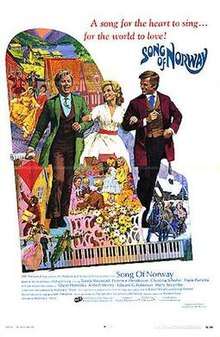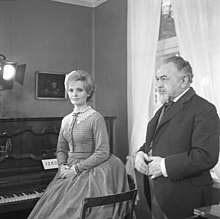Song of Norway (film)
Song of Norway is a 1970 American biographical drama musical film adaptation of the successful operetta of the same name, directed by Andrew L. Stone.
| Song of Norway | |
|---|---|
 1970 theatrical poster | |
| Directed by | Andrew L. Stone |
| Written by | Andrew L. Stone |
| Starring | Toralv Maurstad Florence Henderson |
| Music by | Robert Wright George Forrest, based on the music of Edvard Grieg |
| Cinematography | Davis Boulton |
| Edited by | Virginia Stone |
Production company | |
| Distributed by | Cinerama Releasing Corporation |
Release date |
|
Running time | 142 minutes |
| Country | United States |
| Language | English |
| Budget | $3,625,000[1] |
| Box office | $7,900,000[1] |
Like the play from which it derived, the film tells of the early struggles of composer Edvard Grieg and his attempts to develop an authentic Norwegian national music. It stars Toralv Maurstad as Grieg and features an international cast including Florence Henderson, Christina Schollin, Robert Morley, Harry Secombe, Oskar Homolka, Edward G. Robinson, and Frank Porretta (as Rikard Nordraak). Filmed in Super Panavision 70 by Davis Boulton and presented in single-camera Cinerama in some countries, it was an attempt to capitalize on the success of The Sound of Music, and was the first musical in Cinerama.[2]
Cast

- Toralv Maurstad as Edvard Grieg
- Florence Henderson as Nina Grieg
- Christina Schollin as Therese Berg
- Frank Porretta as Rikard Nordraak
- Oskar Homolka as Engstrand
- Robert Morley as Berg
- Edward G. Robinson as Krogstad
- Harry Secombe as Bioernstjerne Bjoernson
Production
Earl St John announced he would make the film in 1950.[3]
Reception
Song of Norway was one of a series of commercial disasters that followed the success of My Fair Lady and The Sound of Music, two films that led studios to believe that a revival of full-scale musical films was imminent. Similar box-office disasters included Darling Lili, Mame, Paint Your Wagon, and Lost Horizon.[4]
However, the film was popular in some territories. In Britain, it was the most popular "reserved ticket" film of 1971.[5]
It earned rentals of $4.4 million in North America and $3.5 million in other countries, recording an overall loss of $1,075,000.[1]
Critics were virtually unanimously negative on its release, noting especially the aping of The Sound of Music and its generally poor production quality despite obvious expense. In The New Yorker, Pauline Kael wrote: "The movie is of an unbelievable badness; it brings back clichés you didn’t know you knew - they’re practically from the unconscious of moviegoers."[6] The New York Times wrote that the film "was no ordinary movie kitsch, but a display to turn Guy Lombardo livid with envy."[7] Gene Siskel of the Chicago Tribune gave the film half of one star out of four and wrote "The fjords aren't exactly alive with the sound of Grieg thanks to a disastrous screenplay by Andrew Stone who finds it more convenient to photograph a mountain than to write intelligent dialog."[8] Charles Champlin of the Los Angeles Times called the film "inoffensive but unsatisfying" and compared it unfavorably to The Sound of Music, which "had a strong narrative line and generated a good deal of suspense. It's not Grieg's fault he wasn't chased by Nazis, of course, but such trials as there were in his life seem either lacklustre or inappropriate to a family musical."[9] Gary Arnold of The Washington Post wrote that the film had "next to no plot" and "beautiful scenery or not, people are going to lose interest as slowly but surely as they do when watching the neighbors' slides of their trip to Europe."[10]
Critics' views were echoed by cast members. Florence Henderson said that Andrew Stone "approached scenes quite literally and without a lot of imagination".[11] Harry Secombe called it a film "you could take the kids to see...and leave them there."[12]
See also
References
- "ABC's 5 Years of Film Production Profits & Losses". Variety. May 31, 1973. p. 3.
- "Cinerama Holiday". Daily Variety. February 6, 1970. p. 2.
- "SONG OF NORWAY" TO BE ALL BRITISH". The Mirror. Perth, WA: National Library of Australia. October 14, 1950. p. 15. Retrieved October 31, 2015.
- Gray, Timothy M. (February 25, 2003). "Hollywood heavies facing the music". Variety. Retrieved July 29, 2020.
- Waymark, Peter (December 30, 1971). "Richard Burton top draw in British cinemas". The Times. p. 2.
- Kael, Pauline (1971) Deeper into Movies, Calder Boyars
- Quoted in Beck, R. (2002) The Edward G. Robinson Encyclopedia, McFarland. p. 293
- Siskel, Gene (January 1, 1971). "Song of Norway". Chicago Tribune. p. 21 (Section 2).
- Champlin, Charles (November 11, 1970). "Grieg's Life in 'Norway". Los Angeles Times. p. 17, Part IV.
- Arnold, Gary (January 1, 1971). "Song of Norway". The Washington Post. p. B10.
- Kennedy, M. (2015) Roadshow!: The Fall of Film Musicals in the 1960s, OUP. p. 215
- TV-am interview, 1987
External links
| Wikimedia Commons has media related to Song of Norway (film). |
- Song of Norway on IMDb
- Song of Norway at the TCM Movie Database